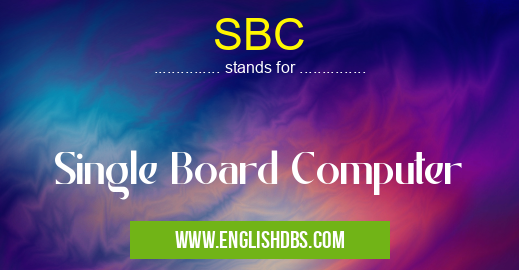What does SBC mean in COMPUTING
In the realm of computing, SBC stands for Single Board Computer. It is a compact and self-contained device that combines essential computer components, such as a processor, memory, storage, and input/output capabilities, onto a single printed circuit board (PCB). SBCs are designed for embedded systems, automation, industrial control, robotics, and various other applications where space and cost are critical factors.

SBC meaning in Computing in Computing
SBC mostly used in an acronym Computing in Category Computing that means Single Board Computer
Shorthand: SBC,
Full Form: Single Board Computer
For more information of "Single Board Computer", see the section below.
Characteristics of SBCs
- Compact Size: SBCs are typically small and lightweight, making them ideal for applications with limited physical space.
- Low Power Consumption: SBCs are designed to be energy-efficient, allowing for extended operation without the need for active cooling or large power supplies.
- Rugged Construction: SBCs are often built with ruggedized components, ensuring reliability and durability in harsh operating conditions.
- Customizable: Many SBCs offer customization options, allowing users to tailor them to specific requirements by adding expansion modules, peripherals, or custom software.
- Cost-Effective: SBCs are a cost-effective solution for embedded systems, providing a low-cost entry point for developing and deploying custom applications.
Applications of SBCs
SBCs find application in a wide range of industries, including:
- Industrial automation and control
- Robotics and autonomous systems
- Medical devices
- Point-of-sale systems
- Smart home devices
- IoT (Internet of Things) gateways
Benefits of Using SBCs
- Reduced Design Time: SBCs provide a pre-built hardware platform, reducing the time and effort required to design and build custom systems.
- Cost Savings: SBCs offer a cost-effective alternative to developing custom hardware, especially for low-volume applications.
- Enhanced Reliability: SBCs are designed for reliability, ensuring stable and long-term operation in demanding environments.
- Flexibility and Customization: SBCs allow for customization to meet specific project requirements, providing flexibility and scalability.
- Rapid Prototyping: SBCs enable rapid prototyping, allowing engineers to quickly develop and test new applications.
Essential Questions and Answers on Single Board Computer in "COMPUTING»COMPUTING"
What is a Single Board Computer (SBC)?
A Single Board Computer (SBC) is a compact electronic circuit board that contains the essential components of a computer system, including a processor, memory, storage, and input/output ports. It is designed to be a complete and functional computer in a single, integrated package.
What are the benefits of using an SBC?
SBCs offer several benefits, including:
- Compact size: SBCs are much smaller than traditional desktop computers, making them ideal for applications where space is limited.
- Low power consumption: SBCs typically consume less power than desktop computers, reducing operating costs and environmental impact.
- Versatility: SBCs can be used in a wide range of applications, from embedded systems to industrial automation and robotics.
What are the different types of SBCs?
There are several different types of SBCs available, each with its own unique features and capabilities. Some common types include:
- ARM-based SBCs: These SBCs use ARM processors and are known for their low power consumption and cost-effectiveness.
- x86-based SBCs: These SBCs use x86 processors and offer higher performance and compatibility with existing software.
- Embedded SBCs: These SBCs are designed specifically for embedded systems and typically offer a combination of low power consumption, compact size, and ruggedness.
How do I choose the right SBC for my project?
When choosing an SBC, consider the following factors:
- Performance: Determine the level of processing power and memory required for your application.
- Power consumption: Consider the power limitations of your application and choose an SBC that meets those requirements.
- I/O capabilities: Ensure the SBC has the necessary input/output ports and interfaces for your peripherals.
- Operating system: Select an SBC that supports the operating system or software you plan to use.
How can I get started with SBC development?
To get started with SBC development, you will need:
- An SBC: Choose an SBC that meets your project requirements.
- An operating system: Install an operating system such as Linux or Windows IoT on your SBC.
- Development tools: Acquire the necessary software tools and libraries for your programming language and operating system.
- Documentation: Refer to the documentation and resources provided by the SBC manufacturer.
Final Words: SBCs are powerful and versatile computing devices that offer a cost-effective and compact solution for embedded systems and automation applications. Their small size, low power consumption, rugged construction, and customizable nature make them ideal for a wide range of industrial, commercial, and consumer applications. As the demand for embedded systems and IoT devices continues to grow, SBCs are expected to play an increasingly significant role in the future of computing.
SBC also stands for: |
|
| All stands for SBC |
